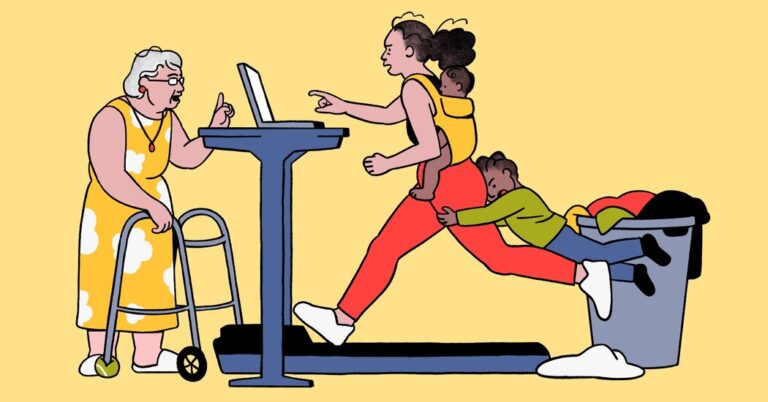Excessive Sitting Linked to Premature Aging Despite Regular Exercise
The Hidden Dangers of Sitting: A New Age Dilemma
In our fast-paced, tech-driven world, many of us find ourselves glued to our seats for hours on end, whether at the office, home, or during our precious downtime. It’s a familiar scene: you start your day at your desk, fire up your laptop, and then the next thing you know, it’s six hours later. Sound familiar? But what if I told you that this comfort could be accelerating your aging process, even if you’re hitting the gym regularly? That’s the crux of an emerging discussion in health research, and it’s high time we explored it.
The Downside of a Sedentary Lifestyle
While the benefits of regular exercise — like improved cardiovascular health, stronger muscles, and less stress — are well-documented, a growing body of evidence suggests that prolonged sitting can have detrimental effects on our health, even for those who are physically active. It’s a classic catch-22: you think you’re doing everything right by exercising, but those hours spent sitting are quietly undermining your efforts.
What’s Causing the Trouble?
So, what’s the science behind this? Research indicates that excessive sitting might lead to metabolic changes in the body, impacting everything from blood sugar levels to hormonal balance. Think of it as being nestled in a comfy couch with a bowl of popcorn while binge-watching your favorite show. What seems like a harmless pastime can lead to long-term consequences for your health.
-
Metabolic Slowdown: When you sit for extended periods, your body experiences a metabolic slowdown. This is linked to increased insulin resistance—an important factor in diabetes and other metabolic disorders.
-
Inflammation: Sitting too long can trigger inflammatory responses. This chronic inflammation is believed to contribute to a variety of health issues, including heart disease and even certain cancers.
-
Muscle Degeneration: All that sitting leads to weakened muscles in your lower body. Your legs have to work harder when you finally do stand up, which can increase the risk of injury.
- Posture Problems: Have you ever noticed how your shoulders sag or your back aches after a long sitting session? Poor posture can lead to chronic pain, which only adds to the toll on your overall health.
The Psychological Impact
Ever experienced that “brain fog” after hours of sitting? You’re not alone. Prolonged sedentary behavior can also lead to mental health issues like anxiety and depression. The connection might lie in a combination of physical inactivity and the social isolation that often accompanies a sedentary lifestyle.
A Dilemma for Regular Exercisers
Now you might be thinking, “But I work out regularly! How can sitting be a problem for me?” It’s a valid question. Many individuals who exercise consistently may not realize that their workout routine doesn’t completely counteract the effects of sitting.
What the Research Says
Recent studies have shown that people who exercise but still sit for long periods can have higher levels of cellular aging markers compared to those who are more active throughout their day. Cellular aging markers are biochemical indicators that gaze into how our cells age. When sitting is excessive, it appears that the positive effects of exercise may not be adequate to offset its dangers.
In fact, one study suggested that even if you exercise for an hour a day, spending the rest of your time sitting can shorten your lifespan. Picture this: you’re clocking in an hour at the gym, but then you’re stationary for 8 to 10 hours. That can be counterproductive!
The Importance of Movement
Now that we’ve tackled the gravity of sitting, let’s chat about the importance of regular movement. Just like an engine needs to run regularly to avoid rust and seize, your body requires movement to function optimally.
Incorporate Micro-Movements
- Stand Up Regularly: It’s essential to stand up at least once every hour, even if it’s just for a brief walk around the office or your home. You can set a timer!
- Stretch It Out: Simple stretches can be a game changer. Reach for the sky or touch your toes, whatever feels good! It revives your muscles and gets your blood flowing.
- Desk Exercises: Who says you can’t engage in a little workout while sitting down? Calf raises, seated leg lifts or even a few chair yoga poses can work wonders.
Active Breaks
Remember, taking short active breaks can mitigate some of the adverse effects of prolonged sitting. How about taking a walk during your lunch break? Or perhaps opting for a standing desk? Your body will thank you!
Finding Balance
Achieving a healthy balance between exercise and movement throughout the day is crucial. Here are some simple suggestions to help balance your sitting habits:
- Mix Up Your Routine: Alternate between sitting, standing, and moving. A standing desk can allow you to vary your posture throughout the day.
- Get Creative: Try walking meetings or phone calls. This can help you rack up those steps while still being productive.
Conclusion
As we wade through this sea of information about health and wellness, it’s vital to remember that movement is life. Yes, breaking a sweat at the gym is incredibly beneficial, but it’s equally important to be mindful of your sitting habits. By slowly incorporating more movement into your day-to-day activities, you can help ward off the negative impacts of excessive sitting and boost your overall quality of life.
Think of your body as a vintage car—you need to keep the engine (your body) running to ensure it continues to perform well. So let’s get moving, shall we?
FAQs
1. How many hours of sitting are considered too much?
Prolonged sitting of more than 6-8 hours a day is often considered excessive and can lead to adverse health effects, even if you exercise regularly.
2. What are some good exercises to do if I sit a lot during the day?
Simple activities like stretching, leg lifts, and even walking can make a difference. Integrate short walks and standing breaks into your routine for optimal results.
3. Can standing desks help reduce the risks of sitting too much?
Absolutely! Standing desks encourage movement and can help reduce the amount of time spent sitting, thus promoting better health outcomes.
4. Is the impact of sitting the same for everyone?
While everyone can be affected by excessive sitting, individual responses can vary. Factors like age, fitness level, and existing health conditions can influence how sitting impacts you.
5. How can I remind myself to move throughout the day?
Setting timers as reminders, using apps designed for movement breaks, or placing sticky notes near your workspace can encourage you to get up and move regularly!







